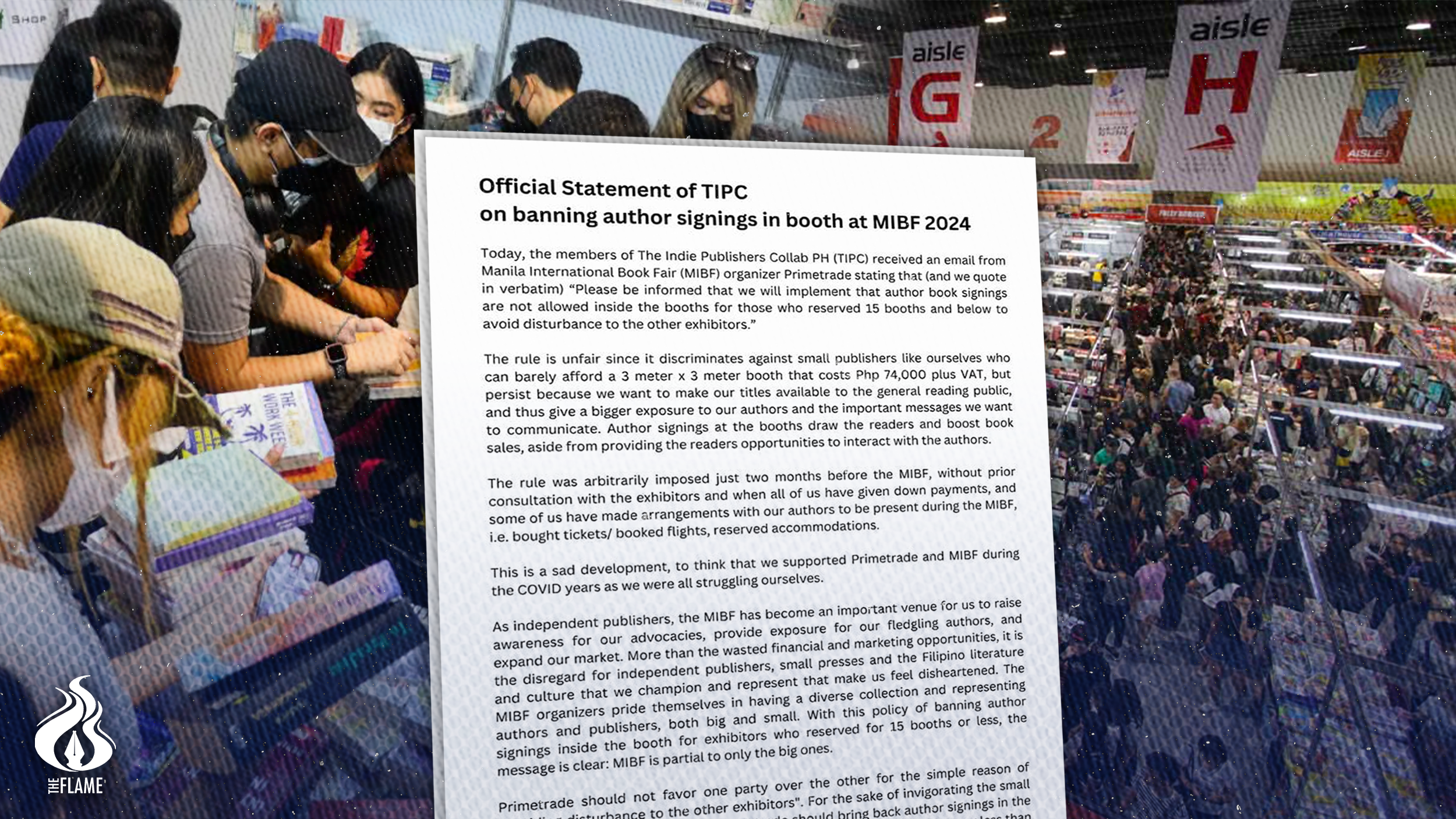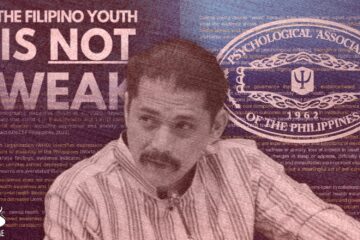
CONCERNS AMONG publishers, authors and readers persist despite the decision of the organizer of the Manila International Book Fair (MIBF) to withdraw the restriction on book signings for exhibitors who reserved 15 booths and below.
Independent publishing group The Indie Publishers Collab PH previously revealed that MIBF organizer Primetrade Asia Inc. had imposed a policy barring exhibitors who reserved 15 booths or below from setting up book signings to “avoid disturbance to other exhibitors.”
Several authors and publishers quickly assailed the now-lifted rule, calling MIBF “partial to only the big ones.”
Two days later, San Anselmo Publishing Inc. executive publisher Marvin Aceron confirmed that the organizer now encourages in-house activities, including book signings in booths, as long as a proper queuing system and crowd control measures are observed. Primetrade’s email message informing publishers of the ban was an “honest mistake” as its higher managers were supposedly not consulted about it, he added.
Implications
Despite the withdrawal of the regulation, some stakeholders of the publishing industry remain concerned over its long-term implications, saying Philippine literature should be accessible and “all-inclusive.”
Aceron described the book signing restriction as “unreasonable” and “ill-advised,” saying it would have limited the opportunity of authors to be recognized by a larger audience.
“It’s a marketplace for us (MIBF). We get a lot of eyeballs there. We don’t expect to sell a lot, but we want people to notice that we exist and if they try us out, we’re worth their while,” Aceron told The Flame.
“They (Primetrade) acknowledged that the idea of banning the signing for those with less than 15 booths is ill-advised. The brilliant thing about it was they realized that recalling it was the wiser thing to do,” he added.
UST Creative Writing coordinator and author Assoc. Prof. Joselito delos Reyes said while the MIBF operates through commerce and capital, its driving force should be the “like-minded” individuals attending the book fair to celebrate similar interests.
“While it is part of a fair’s [nature] to earn a profit, I hope this is not the main reason. With the amount of work anchored in books and reading materials, the fair gives the opportunity to promote the country’s literature, at least in the aspect of supporting it,” delos Reyes said.
“As an author, it is a good validation that you know your [pieces] are being read, understood and enjoyed. Although it is rare to earn a living as a writer in this country,” he added.
Delos Reyes said the influx of fair attendees should be viewed with optimism since it builds both the reputation and financial opportunities for budding writers.
“Many small and independent publishers rely on the influx of people, that’s why they also spend a lot of money even though it’s costly just to get a spot… Even if they cannot keep up with the huge spaces of big businesses inside the fair, they still won’t lose their readers who have spent time and money for this occasion,” he said.
“Let’s not limit their (authors) ability to introduce their creations to more people.”
UST Political Science Asst. Prof. Ronald Castillo found the situation “embarrassing” since Primetrade had supposedly failed to provide “community access” to Philippine literature.
“The supposed largest book fair event of the year [succumbed] to capitalist greed and [forced] authors to reserve more booths to have the capacity for book signings… I hope organizers maintain a balance between their need to capitalize and their vision and mission for what they do,” he said.
According to Castillo, the restriction would have resulted in a “loss” since it would deprive the MIBF of the chance to discover promising authors.
“[I]t will not just limit the author but also the MIBF itself. Imagine the loss if an author rose to prominence through other fairs or other networks but not through MIBF,” he said.
Castillo said small local publishers are essential to the industry since they provide potential readers more choices.
“We might as well remove the ‘M’ in MIBF if we won’t be promoting our own. The best way to learn about our culture is from the words and experiences of our people,” Castillo said.
UST Creative Writing instructor and Philippine Free Press literary editor Joel Toledo noted that the public’s criticism of the restriction had pushed the organizer to be inclusive.
“Given what happened, I think the MIBF will be more inclusive and more aware of the need for small publisher representation from now on. In this sense, it’s actually a good thing that this leak happened,” he said.
“We should indeed have space for small publishers in any big book fair, without subtle threats that sound both biased for big promoters and punitive of indie pubs.”
According to Toledo, the book fair should showcase the diversity of literary genres to expose the works of Filipino authors to a wider reading public.
“As a writer of poetry, a historically non-bestseller genre, I am surely in the mindset that venues for promoting our own books like the MIBF should always represent Filipino works and promote them to a larger audience. Otherwise, the world of reading will just revolve around what sells,” he said.
Capitalist tendencies
Quoting Filipino-Spanish industrialist Andrés Soriano, Aceron said book fair organizers should “profit with honor” and seek guidance from philosophers to protect humanity from capitalist tendencies.
“For this to happen, I hope they will start by considering to solicit the advice from philosophers and thinkers… Hopefully, some wisdom touches them and we bring some more humanity to this capitalist country,” he said.
While the industry mainly relies on profit, delos Reyes said publishing should still strike a balance between earning a livelihood and developing a reading culture among Filipinos.
“Producing literature always has a business side, from writing to publishing to distribution. It all has capital: time, money, facilities, skills. Someone has to make a profit because there is a livelihood to be met, because someone has invested. The problem is when only purely business will always exist,” he said.
Delos Reyes said issues similar to the book restriction would remain unless there is proper education and recognition for producing literature.
“This… will happen again until there is no state-subsidy for the creation of literary pieces. As long as there is no higher recognition of literature and education,” he said.
Castillo called on book fair organizers to refrain from being influenced by financial considerations at the expense of small publishers and budding authors.
“I hope MIBF management avoids the temptations of greed and focuses on productive, fair events. Income generation is, of course, a must, but they should avoid rent-seeking activities that generate revenue while creating unfair circumstances for the community,” he added.
The MIBF is the largest and longest-running book bazaar in the country, showcasing over a hundred exhibitors annually. This year’s fair will be held from Sept. 11 to 15 at the SMX Convention Center in Pasay City. F



